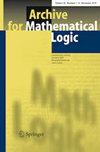列表的无量纲归纳法
IF 0.4
4区 数学
Q1 Arts and Humanities
引用次数: 0
摘要
我们研究了类似 Lisp 的列表的无量纲归纳法,它是由空列表 \( nil \)和在列表前添加元素的操作 \({\textit{cons}}\)归纳构建的。首先,我们证明对于(m)来说,无量纲的(m)步归纳法并不能模拟无量纲的((m + 1)步归纳法)。其次,我们证明了对于所有的(m),无量纲的(m)步归纳法并不能证明左递归定义的列表上的连接操作的右取消属性。本文章由计算机程序翻译,如有差异,请以英文原文为准。

Quantifier-free induction for lists
We investigate quantifier-free induction for Lisp-like lists constructed inductively from the empty list \( nil \) and the operation \({\textit{cons}}\), that adds an element to the front of a list. First we show that, for \(m \ge 1\), quantifier-free \(m\)-step induction does not simulate quantifier-free \((m + 1)\)-step induction. Secondly, we show that for all \(m \ge 1\), quantifier-free \(m\)-step induction does not prove the right cancellation property of the concatenation operation on lists defined by left-recursion.
求助全文
通过发布文献求助,成功后即可免费获取论文全文。
去求助
来源期刊

Archive for Mathematical Logic
MATHEMATICS-LOGIC
CiteScore
0.80
自引率
0.00%
发文量
45
审稿时长
6-12 weeks
期刊介绍:
The journal publishes research papers and occasionally surveys or expositions on mathematical logic. Contributions are also welcomed from other related areas, such as theoretical computer science or philosophy, as long as the methods of mathematical logic play a significant role. The journal therefore addresses logicians and mathematicians, computer scientists, and philosophers who are interested in the applications of mathematical logic in their own field, as well as its interactions with other areas of research.
 求助内容:
求助内容: 应助结果提醒方式:
应助结果提醒方式:


